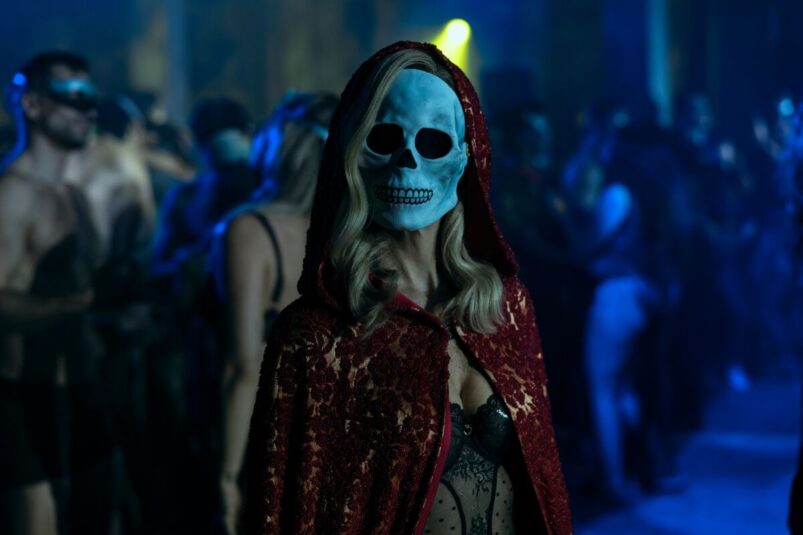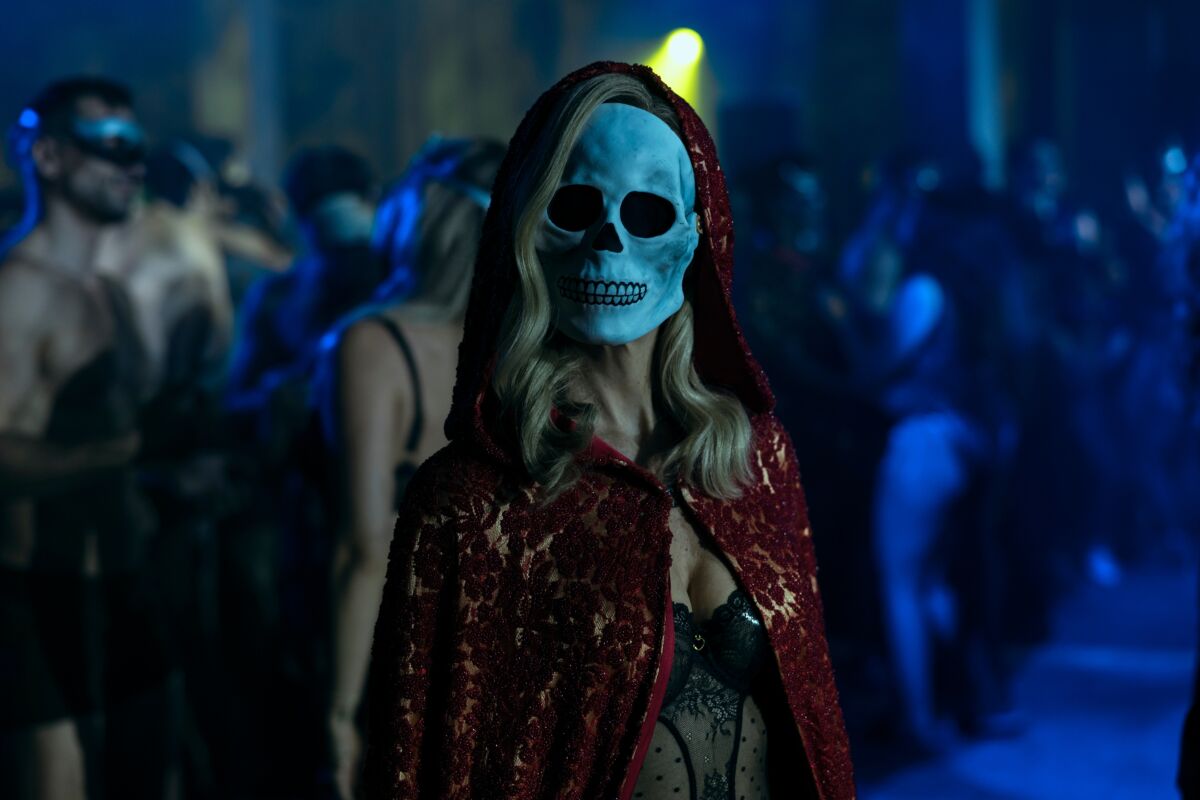If nothing else, I have to give The Fall Of The House Of Usher this – when an unsympathetic character gouges a cat’s eye out, usually it doesn’t make me laugh so hard I can’t breathe.
Mike Flanagan cemented his particular horror style with The Haunting Of Hill House, and it hasn’t failed him yet – the unfolding of flashbacks and parallel timelines, a surprisingly good use of the wheezy old jumpscare, and a thick, peaty slug of Carla Gugino. The Fall Of The House Of Usher has all these reliable components, but it’s also added the influence of Edgar Allan Poe, as well as some possibly-accidental comedy.
Although The Fall Of The House Of Usher is an adaptation of Poe’s works, you won’t have to do the reading, or sit through some interminable undergraduate listing of all the ways Flanagan’s diverged from the master. This is using Poe with a light touch, far lighter than The Haunting Of Bly Manor was drawing upon The Turn Of The Screw.
Nonetheless, anyone from those who saw the first Simpsons Halloween special to serious Poe aficionados can probably have some fun seeing how many references they can pick up on, since it doesn’t stick to the original The Fall Of The House Of Usher but samples and plays with all Poe’s greatest hits. It is chock-a-block, and for all the looseness of the adaptation, the Poe vibes are present throughout.
In fact, even those with no knowledge of Poe whatsoever will be able to notice when the writing slips in some of his actual passages – turning to gothic 18th-century literary fancifulness, in sudden departures from too-contemporary monologues that make blunt reference to people like Billie Eilish. The joins are very obvious and more than a little distracting.
Just as much as anything Poe ever wrote on (writing-desks or otherwise), what The Fall Of The House Of Usher is drawing heavily from is the many modern dramas about clans of incredibly wealthy people who have some hubric downfall practically salivating for them. Succession, Power, and God knows House Of The Dragon too, this is the model that Flanagan is here trying to turn into horror.
It’s probably for this reason that the show finds itself overly enamoured with its scenes of rich people in fancy living spaces, to the point it drowns out the horror for much of the runtime. You could argue that horror is one of those homeopathic things where less of it has more impact, and sure it can still make its presence felt when it is there, but generally it feels more like the ratio’s off.
A great number of horror – and specifically slasher – films make a point of introducing of the hapless dweebs who we’re about to see killed off in incredibly brutal fashion. The Fall Of The House Of Usher takes this industry standard as its spine, spending its first hour giving each of the Usherettes an establishing character moment, before setting the narrative after them at a steady rate of one per episode.
In that same grand tradition, it does of course make you want to see the Usher clan come to their various sticky ends. They are, to a man, ghastly ticks with more money than you, and in most cases their only redeeming qualities are a possible moment of realising how badly they’ve screwed up, moments before they die.
Herein lies the issue with The Fall Of The House Of Usher’s horror credentials: having presented this smorgasbord of awful, awful people, you can throw all the jumpscares you like at them, you can dispatch them as bloodily as a scene from Cannibal Holocaust, but it often ends up more funny than scary. Especially when the gore is filtered through Poe-style melodrama.
So, those final moments of brutal catharsis end up a source of yuks a bit too often. What about the tension leading up to it? The terrified reaching for the door handle, the long corridor that leads into darkness? That side of things, too (which Flanagan has deployed excellently in the past) ends up underserved, again marginalised by the glitz and glamour of a family drama involving rich people.
The issues with marrying these two clear strands of The Fall Of The House Of Usher – horror, and rich idiots’ shenanigans – are best summarised in the multiple occasions a monologue about how the world works is interrupted by a jumpscare. These monologues of pseudo-hard truths are a stock in trade of any work that’s voyeuristic in its treatment of wealthy monsters, and here is no exception.
(One of the monologues concerns that old saying ‘when life gives you lemons, make lemonade’ – and any treatment of that will inevitably come in second to Cave Johnson.)
Given that, those two strands does manage to hang together surprisingly well elsewhere. Part of the whole billionaire-zoo experience is of course their catalogue of excesses and misdeeds. To have these underlying horrors bubble to the surface seems so natural you can generally forgive the leaps in logic that get us there.
It’s for that reason that I have to give The Fall Of The House Of Usher credit for having a character actually ask the question ‘but wait, how can you be relating these events that you weren’t present for, where all the witnesses died?’. To be sure, this is a work ostentatiously flagging up its own flaws (and the answer is fairly silly), but you can forgive a modern-day Poe adaptation a certain amount of kitschiness.
And while it’s no Oscar performance, I particularly enjoyed Mark Hamill as a certain Arthur Gordon Pym, here rendered the Usher family’s gravel-voiced fixer. His role has heavy overtones of Jonathan Banks in Breaking Bad, who was himself such a watchable presence that Vince Gilligan got all soppy and gave him a backstory, rather than just leaving him as ruthless and effective, as Hamill is here. Perhaps it’s just a matter of having one guy present who can actually do their job, rather than desperately flanneling.
All told, The Fall Of The House Of Usher probably didn’t need to run for well over eight hours. Towards the back end this becomes increasingly obvious as it puts off the reveals it’s so shamelessly hinting towards in favour of more overwrought monologues, and sometimes even poetry (Poe’s, naturally). Luckily, though, it manages to keep these less-taut sequences away from times when you might be in danger of thinking through some of the less plausible material, which comes up a lot.
READ MORE: 16 Best Horror Shows to Stream Right Now
Some of the coverage you find on Cultured Vultures contains affiliate links, which provide us with small commissions based on purchases made from visiting our site.


